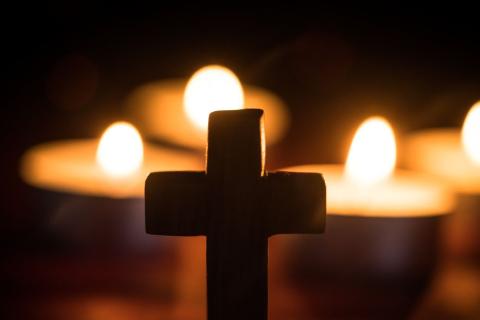
Photo by atonementfriars.org. Fr. Jim Loughran, SA heads the Graymoor Ecumenical and Interreligious Institute in New York City
Ecumenism truly is about relationship building. Technically, it’s about relationship building between churches and among churches. The churches are not just institutions; the churches have people in them. Churches are gatherings of the faith, the body of Christ.
And so we see the body of Christ divided because of history and persecution, because of our history of misunderstanding. We see the body of Christ in pain, and we don’t want the body of Christ to be in pain.
We see a person-to-person relationship as a wonderful gift to ecumenism. There are all kinds of theological documents, which have come out and they have brought us closer. We have achieved so much in 60 years of dialogue with other Christians on the theological level.
But eventually, it’s about understanding why we come from such diverse backgrounds.
The role of prayer for ecumenism
The Week of Prayer for Christian Unity is timeless: it is a way is to bring people together in prayer. It is never threatening, because prayer is embracing God. Prayer is about this wonderful relationship that we have with God. No matter what kind of Christian we may be, or to which church we might belong, we know that our destiny is in Christ Jesus, and in our communion with Christ Jesus, through prayer to the Father, the Son and the Holy Spirit.
We see ourselves as if we were brought up into the unity of the Trinity. And it’s part of the Week of Prayer for Christian Unity that people begin to ask, “Why are we separated?” We can pray together and see each other as brothers and sisters in the quest for being part of the kingdom of God. We know that everyone in that chapel, wherever we’re praying, we know that everyone’s prayer is being listened to by God.
There is no separation. And people come away from the Week of Prayer feeling very good about one another.
There is another aspect about the power of prayer: when we are praying that the prayer of Jesus in John 17:21 might come true, “That they all may be one,” the power of prayer really brings the Holy Spirit, and the power of the Holy Spirit helps us to overcome our divisions.
So it’s not just something to do in January that makes people feel good, but it is also a very powerful tool to bring about unity.
Keeping on working for Christian unity
There was a friar who was a veteran of the ecumenical movement who told me years ago: “Well, it looks like it’s an ecumenical winter, that people are not that interested anymore in the ecumenical movement. It was very exciting in the 1970s and the 1980s, but now it seems less timely and demanded.
“But,” he said to me, “when no one else is doing it, the friars must do it.”
We must be reminded over and over again that the Society of the Atonement, our religious community, was founded to reunite the church, and that we continue to pray for that reason.
We continue to pray for the unity of Christians. Our name, Franciscan Friars of the Atonement, may be seen as expiation, or making amends, but that’s not the only meaning of this very uniquely English word from the King James Bible. The Merriam-Webster dictionary also mentions the meaning, “to make one what is meant to be one,” and so the expiation continues to bear fruit in the grace of reconciliation.
Many Bible versions translate Romans 5:11 now with the word “reconciliation” and not “expiation” (see NIV, “but we also boast in God through our Lord Jesus Christ, through whom we have now received reconciliation.”). It is part of what we are and what we do.
My energy and enthusiasm to work for Christian unity comes from the fact that my spiritual DNA, you might say, is linked to Christian unity. And that gives me great hope.
Seeking justice
The theme of this year’s Week of Prayer for Christian Unity is taken from Isaiah, and it is about “being the people who are learning to do good and to seek justice,” referring to the Bible verse, “Do good; seek justice” (Isaiah 1:17).
The material comes to us this year from the Minnesota Council of Churches, which was chosen by the World Council of Churches and the Holy See’s Dicastery for Christian Unity because of the death of George Floyd in Minneapolis. Because of all the trouble that we face in the U.S. about equal rights, about justice, it could be controversial, because Americans can be found on both sides of the great divide in our country.
Yet it comes from Isaiah and so what we’re trying to do is remind ourselves that we ought to be good people, and in order to be that, we seek justice. And that itself is a message that comes from God.












